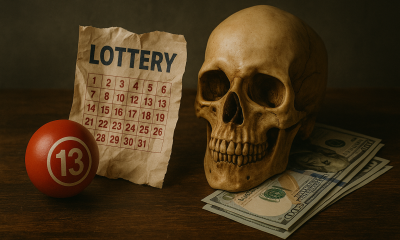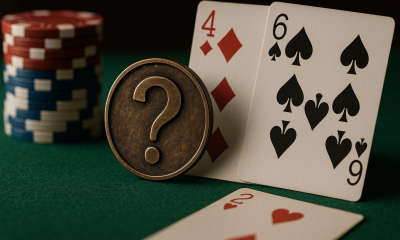Psychology
The Social Aspect of Gambling: Why We Bet More in Groups

Gambling is very much an individual source of entertainment and something that players do to get their kicks and zone out. We don’t have shared accounts at online casinos, and at licensed casinos, you can only deposit with bank accounts registered in your name. Yet the research and analytics point towards people gambling more when they are betting or playing in groups.
Especially in sports betting, where sports fans can hype up the thrills and even bet more than they would otherwise. Casino games do not have the same type of social interaction as sports bets. Though there are specific types of games that can enhance this social aspect, such as live dealer tables, bingo, or poker cashgames.
Peer Influence in Gambling
When we play casino games or bet on sports, we are testing the odds and getting a thrill from the risk taking. Just anticipating what may happen can make your brain release dopamine, stimulating and motivating you to take the risk. Perceiving the dangers, we also feel the effects of a higher level of cortisol, the stress hormone. And when we gamble, the mixture of hope and stress, a winner’s joy and losers remorse, put us through a powerful rollercoaster of emotions. When you add in a social element to it, these emotional responses can be amplified tremendously.
That is the key word here, amplified. It becomes even more exciting to share and brag about your wins with friends. Losing can also become a source of bragging for all the wrong reasons. The social element can reinforce gambling habits, make us want to risk more, and even build some friendly competition. On a larger scale, this social element can also spread to social media, not just normalizing gambling but making it more attractive to new demographics. The latter is truly dangerous, as gambling can be glamorised in social media, prompting people to play without realising the full extent of the dangers.

Normalising Gambling and Creating Misconceptions
We are social creatures and take cues from society to work out what is acceptable, normal, or even potentially exciting. An increase in gambling in certain peer groups will naturally draw attention to these vices and lead to more people trying it out. Especially when people we know are playing games. It is the Social Proof, a phenomenon where we assume something is correct because it is accepted in society. Now we aren’t saying it is necessarily bad to bet on sports or play the occasional casino game. But you must know the dangers.
“Skill Based” Gambling
The notion that gambling is easy money is absolutely false, and it endangers anyone who hasn’t had any exposure to gambling. Another common gambler’s fallacy is the illusion of control, or mistaking a game with an element of skill, for a purely skill-based game. A blackjack player who uses a basic blackjack strategy and counts cards may brag about their supposed unfair advantage against the house. Talking of their exploits, it may mislead the listener to believe that, yes, this player has perfected their skills and can win playing blackjack. But it is a fallacy, as blackjack relies on chance. Even if you are card counting and the cards happen to line up your way, you still need to calculate the probabilities. And as soon as the dealer reshuffles the cards, you have to start counting from scratch.
In sports betting this is more palpable. As sports betting can become a very social activity, with groups of friends making predictions, showing off their previous wins, and looking to make the next big win. You can do your homework and make informed decisions, perhaps even your sports expertise can also give you a perceived edge. However, sports betting is also something that completely boils down to chance. The sportsbook has no influence over the result, and anything can happen.
Yet they don’t leave it all to chance. Oddsmakers calculate odds in a way that they have an edge over the bettors. By adding juice, a seemingly invisible commission, to all their wagers, they can insure a profit in the long run.
Encouraging Riskier Behavior
Social gambling can lead us to make riskier decisions as we look to outdo our friends and try to score bigger wins. It could be in taking riskier bets, such as larger parlay wagers in sports. Or, increasing your stake when playing blackjack, baccarat or slots. In roulette, the risk can be increased by either staking bigger money, or picking riskier wagers, or both.
It goes back to misconceptions. If you see your friend win big it may encourage you to try a risky wager and attempt to hit a similarly large return. This may also build peer pressure on you to make a similarly outlandish or risky bet. And this can trivialise the risks and thus distort your understanding of the odds.
Winning is not the only area that is amplified by social gambling. The psychology of losing is also made more potent. The sense of remorse after a loss can feel far more crushing when you see someone else winning. It becomes a source of embarrassment to some, putting the pressure on to redeem themselves with a win. Especially when you throw in that misconception about how gambling is a skill based endeavor. It may feel like it was their misjudgment, inexperience, or lack of knowledge that led to a loss. Of course, this is not the case.
And so to overcome the feeling of remorse, it becomes even more important to try again and win the next time. Or better yet, chase the losses and win back the money. This kind of risky behavior can build extremely dangerous gambling habits, that can easily spiral out of control.

Social Gambling Across Different Endeavors
The social effects vary heavily depending on what kind of gambling we are analysing. Slots, scratchcards, or other arcade games with no skill based element don’t have as much social interaction in themselves. However, if the casino wants to drive up engagement and create a social aspect to slots, it can do so by making tournaments and player contests. Then, there is sports betting, which creates a social aspect purely by itself, without the need for engagement driving devices or initiatives.
Let’s just go through the main types of gambling and analyse their social aspects.
Sports Betting
Naturally drives high social engagement. You can make predictions, share tips, celebrate wins and consolidate losses together. Some sportsbooks create betting pools, player contests, or leaderboards to encourage the social aspect. It can also lead to bettors collaborating on picks, looking for the best value odds, and putting together betting strategies.
Slots
A solo game, the social engagement in slots is quite low. Players may brag about wins with their peers, but slots don’t have any skill element, are fast paced and repetitive. If you don’t hit a huge jackpot; there won’t be a big moment or much to really talk about. Casinos tend to drive the social aspect through tournaments, player contests, sharing big jackpot wins, and other devices.
Live Games
There are two reasons players head to live tables. One, is because they use real decks of cards – that can be counted for blackjack gamers and are not automatically shuffled before each draw. The other, is because of the community feel and atmosphere of the games. The presence of a real dealer breathes life into the games, and makes them more interactive. As do the other players, and it can add a level of competition among players, or build greater excitement.
Skill Based Games
Any blackjack game with real cards, video poker, sports betting or poker rooms are all forms of “skill based games“. Sure, you can develop skills or use master strategies to reduce the house edge, but it will not swing in your favor. Skill based games can build the misconception that you can get better and win the games if you put in the effort. In social groups, these illusions can be quite convincing and lull inexperienced players into all sorts of fallacies and misconceptions.

Most Dangerous Gambler’s Fallacies
When surrounded by peers, we are more likely to believe in superstitions and typical fallacies. For instance, the hot hand fallacy, a type of optimism bias in which you overestimate the chances of winning. You could have an optimism bias on your friend’s sports betting predictions. They got 3 parlay wins in a row, so I will copy their next bet slip.
It could also build assumptions like you are due a win, because your friends have won but you haven’t yet. Another classic one is the gambler’s conceit, where you think you can quit while you are ahead. You are on a winning streak and want to extend this good streak of variance to maximise the potential returns. The idea is that you will know when to quit in time, and do so at the peak of your bankroll.
But this is a very common undoing of gamblers and something quite prominent in social gambling circles. We tend to overplay the chances of winning and underplay losses. Or, chase the losses and return to square one. The social aspect can mask the reality about gambling odds and probability.
Staying Safe and Maintaining Control
The social effect on gambling is not all bad, as it can make it a lot more enjoyable. You should know the risks of gambling to ensure you don’t end up getting swept away with the hype. You must set some boundaries.
- Never gamble when feeling down: The worst thing you can do is gamble as a means to release dopamine. This can lead to gambling becoming a crutch to feel good, and it will ultimately have the opposite effect. Don’t gamble while intoxicated, and gamble with rationale, not based on emotion.
- Set a budget: Make a bankroll for your gambling based on how much you can afford to lose. Don’t think of it as a financial investment. Don’t make a budget based on how much you could win when betting. There are no guarantees you will make any money, and you must be prepared for the worst.
- Take breaks: When you feel tired or under pressure, it is best to call it quits and take a break. After playing for longer periods of time, it is easier to fall prey to gambler’s fallacies and psychological pitfalls. Gambling doesn’t only mentally tire you, but it can also impact you physically. As stress levels are maintained and your dopamine regulation alters, you are increasingly vulnerable to psychological traps.
- Set an example: Being responsible in your gambling doesn’t only prevent addiction but it also helps others recognise the risks. By setting limits and taking breaks, you encourage others to be more mindful about their gambling and less frivolous in their endeavors.
Don’t play casino games or take your sports betting to excess. They are intended for entertainment purposes only. And when casino games or sports bets stop being fun, its best to take a break.











